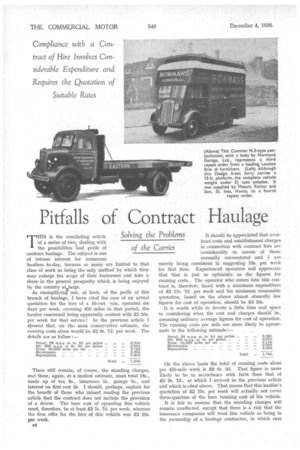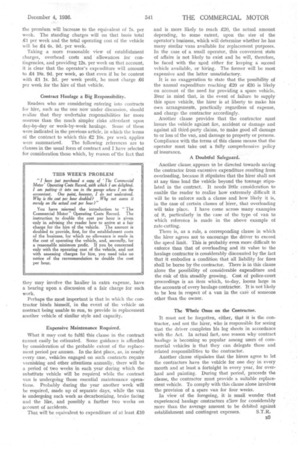Pitfalls of Contract Haulage
Page 42

Page 43

If you've noticed an error in this article please click here to report it so we can fix it.
Compliance with a Contract of Hire Involves Considerable Expenditure and Requires the Quotation of
Suitable Rates
THIS is the concluding article of a series of two, dealing with the possibilities 'and perils of contract haulage. The subject is one
of intense interest for numerous
hauliers to-day, because so many are limited to that class of work as being the only method by which they may enlarge the scope of their businesses and take a share in the general prosperity which is being enjoyed by the country atglaxge.
As exemplifying!' one, at least, of the perils of this branch of haulage, I have cited the case of an actual quotation for the hire of a 10-cwt. van, operated six days per week, covering 450 miles in that period, the haulier concerned being apparently content with £2 10s. per week for that service ! In the previous article 1 showed that, on the most conservative estimate, the running costs alone would be £2 9s. 7d. per week. The details are as follow :
Petrol; 28 m.p.g. at 1s. 2(1. per gallon Oil: 900 m.p.g. at 2s. 6d. per gallon ... Tyres: 20,000 miles per set
There still remain, of course, the standing charges, and these, again, at a modest estimate, must total 18s., made up of tax 6s., insurance 5s., garage 5s., and interest on first cost 2s. I should, perhaps, explain for the benefit of those who missed reading the previous article that the contract does not include the provision of a driver. The bare cost of operating this vehicle must, therefore, be at least £3 7s. 7d. per week, whereas the firm offer for the hire of this vehicle was £2 10s. per week.
B8 It should be appreciated that overhead costs and establishment charges in connection with contract hire are considerably in excess of those
normally encountered and I am merely being consistent in suggesting 10s. per week for that item. Experienced operators will appreciate that that is just as optimistic as the figures for running costs. The operator who enters into this contract is, therefore, faced with a minimum expenditure of £3 17s. 7d. per week and his minimum reasonable quotation, based on the above almost absurdly low figures for cost of operation, should be £4 16s.
It is worth while to devote a little time and space to considering what the cost and charges should be, assuming ordinary average figures for cost of operation. The running costs per mile are more likely to aproximate to the following estimate :— Petrol: 24 m.p.g. at is. 2d. per gallon ...
Oil: 900 mpg. at 4s. per gallon ... Tyres: 16,000 miles per set ...
On the above basis the total of running costs alone per 450-mile week is £3 Os. 9d. That figure is more likely to be in accordance with facts than that of £2 9s. 7d., at which I arrived in the previous article and which is cited above. That means that this haulier's quotation of £2 10s. per week will actually not cover three-quarters of the bare running cost of his vehicle.
It is fair to assume that the standing charges will remain unaffected, except that there is a risk that the insurance companies will treat this vehicle as being in the ownership of a haulage contractor, in which case the premium will increase to the equivalent of 7s. per week. The standing charges will on that basis total £1 per week and the total operating cost of the vehicle will be Li Gs. 9d. per week.
Taking a more reasonable view of establishment charges, overhead costs and allowances for contingencies, and providing 12s. per week on that account, it is clear that the operator's expenditure will amount to £4 18s, ed. per week, so that even if he be content with Li is. 3d. per week profit, he must charge £6 per week for the hire of that vehicle.
Contract Haulage a Big Responsibility.
Readers who are considering entering into contracts for hire, such as the one now under discussion, should realize that they undertake responsibilities far more onerous than the much simpler risks attendant upon day-by-day or week-by-week haulage. Some of these were indicated in the previous article, in which the terms of the contract to which this 22 10s. per week applies
were summarized. The following references are to clauses in the usual form of contract and I have selected for consideration those which, by reason of-the fact that
they may involve the haulier in extra expense, have a bearing upon a discussion of a fair charge for such work.
Perhaps the most important is that in which the contractor binds himself, in the event of the vehicle on contract being unable to run, to provide in replacement another vehicle of similar style and capacity.
Expensive Maintenance Required.
What it may cost to fulfil this clause in the contract cannot easily be estimated. Some guidance is afforded by consideration of the probable extent of the replacement period per annum. In the first place, as, in nearly every case, vehicles engaged on such contracts require varnishing and other attentions annually, there will be a period of two weeks in each year during which the substitute vehicle will be required while the contract van is undergoing those essential maintenance operations. Probably during the year another week will be required, made up of separate days, while the van is undergoing such work as decarbonizing, brake facing and the like, and possibly a further two weeks on account of accidents.
That will be equivalent to expenditure of at least and is more likely to reach £20, the actual amount depending, to some extent, upon the size of the operator's business, which will determine whether he has many similar vans available for replacement purposes. In the case of a small operator, this convenient state of affairs is not likely to exist and he will, therefore, be faced with the tined either for keeping a second vehicle available, or hiring. The former will be most expensive and the latter unsatisfactory.
It is no exaggeration to state that -the possibility of the annual expenditure reaching £20 or £30 is likely on account of the need for providing a spare vehicle. Bear in mind that, in the event of failure to supply this spare vehicle, the hirer is at liberty to make his own arrangements, practically regardless of expense, and charge the contractor accordingly.
. Another clause provides that the contractor must insure the vehicle against fire, accident or damage and against all third-party claims, to male good all damage to or loss of the van, and damage to property or persons. Compliance with the terms of this clause means that the operator must take out a fully comprehensive policy of insurance.
A Doubtful Sateguarcl.
Another clause appears to be directed towards saving the contractor from excessive expenditure resulting from overloading, because it stipulates that the hirer shall not at any time load the vehicle beyond the tonnage. stipulated in the contract. It needs little consideration to enable the reader to realize how extremely difficult it will be to enforce such a clause and how likely it is, in the case of certain classes of hirer, that overloading will take place. I have come across many examples of it, particularly in the case of the type of van to which reference is made in the above example of rate-cutting.
There is, as a rule, a corresponding clause in which _the hirer agrees not to encourage the driver to exceed the speed limit. This is probably event more difficult to enforce than that of overloading and its value to the haulage contractor is considerably discounted by the fact that it embodies a condition that all liability for fines shall be borne by the contractor. There is in this clause alone the possibility of considerable expenditure and the risk of this steadily growing. Cost of police-court proceedings is an item which, to-day, looms large in the accounts of every haulage contractor. It is not likely to be less in respect of a van in the care of someone other than the owner.
The Whole Onus on the Contractor.
It must not be forgotten, either, that it is the contractor, and not the hirer, who is responsible for seeing that the driver completes his log sheets in accordance with the Act. In actual fact, one reason why contract haulage is becoming so popular among users of commercial vehicles is that they can delegate these and related responsibilities to the contractor.
Another clause stipulates that the hirers agree to let the contractors have the vehicle for one day in every month and at least a fortnight in every year, for overhaul and painting. During that period, proceeds the clause, the contractor must provide a suitable replacement vehicle. To comply with this clause alone involves the provision of a spare van for four weeks.
In view of the foregoing, it is small wonder that experienced haulage contractors allow, for considerably more than the average amount to be debited against establishment arid contingent expenses. S.T.R.




























































































